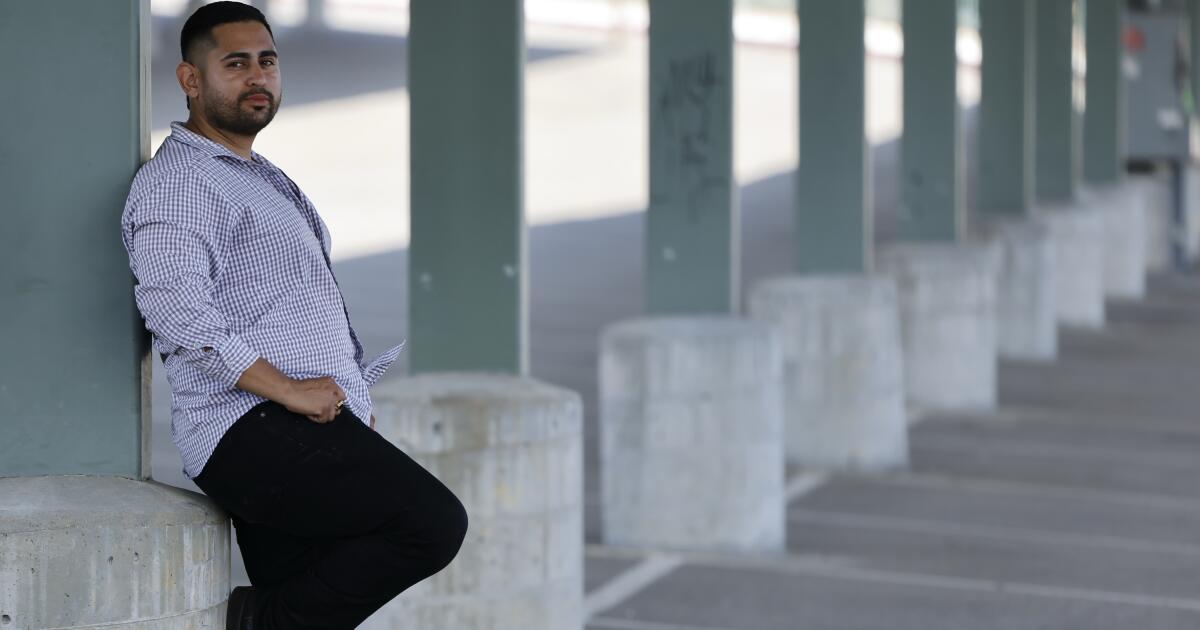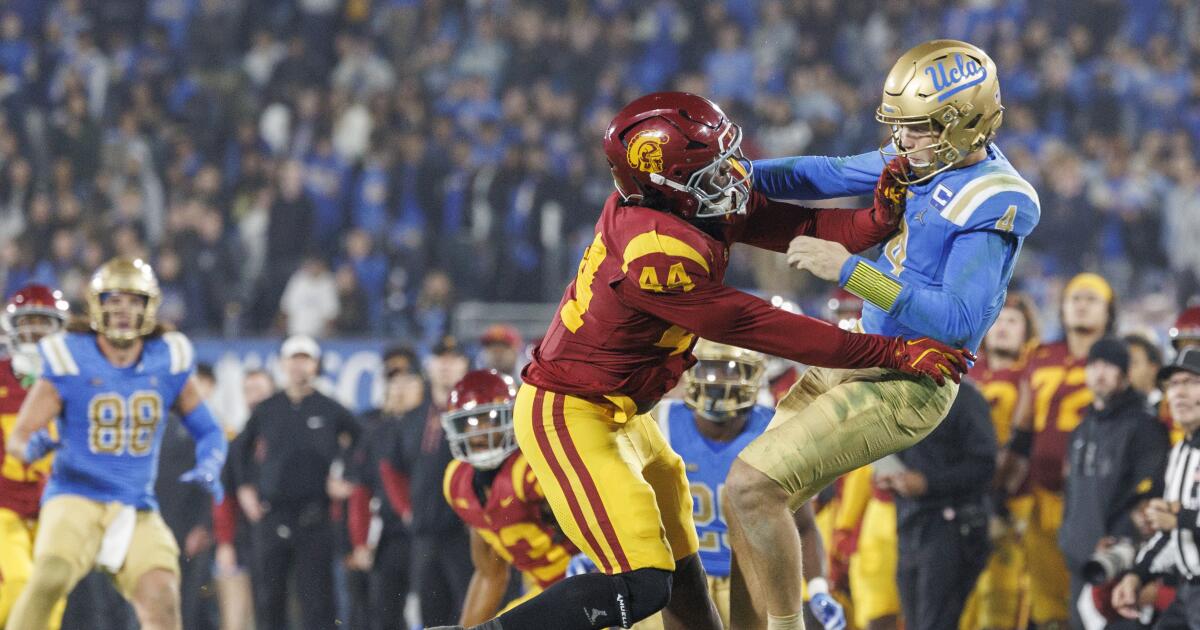California voters are sharply divided along party lines over the Trump administration's immigration raids this year in Los Angeles and across the country, according to a new poll.
Just over half of the state's registered voters oppose federal efforts to reduce illegal immigration, and 61% oppose deporting everyone without legal status, the data shows. recent survey The study from UC Berkeley's Possibility Lab was published in The Times on Wednesday.
But there is a sharp difference of opinion based on political views.
Nearly 80% of Democrats oppose reducing the number of people entering the United States illegally and 90% oppose deporting all undocumented residents, according to the poll. Among Republicans, 5% oppose reducing admissions and 10% don't believe all illegal immigrants should be forced to leave.
“The biggest thing we found, not surprisingly, is that Democrats and Republicans look really different,” said political scientist Amy Lerman, director of the Opportunity Lab at the University of California, Berkeley, which studies race, public opinion and political behavior. “From that perspective, they fall pretty neatly along party lines. While there are some differences within parties on things like age and race, the big gap is actually between Democrats and Republicans.”
While there were some differences by gender, age, income, geography and race, the results largely reflected the state's partisan divide, Lerman said.
One notable finding, Lerman said, was that nearly a quarter of survey respondents personally knew or knew someone in their family or group of friends who was directly affected by the deportation attempt.
“It’s a really significant proportion,” she said. “Similarly, we are seeing people report that people in their communities are so worried about deportation efforts that they are not sending their children to school, shopping at local stores, going to work,” seeking medical care or attending church services.
The poll was conducted among the state's registered voters and did not take into account the sentiments of the hardest-hit communities — unregistered voters or those who are ineligible to vote because they are not citizens.
Just over 23 million of California's 39.5 million residents were registered to vote as of the end of October, according to the Secretary of State's Office.
“So if we think about the population of California as a whole, this is really a significant underestimation of the impact, even though we are seeing really significant impacts on communities,” she said.
Earlier this year, U.S. Immigration and Customs Enforcement launched a series of raids in Los Angeles and surrounding areas the rate spiked in June, sparking fear and outrage in Latino communities. Despite opposition from Gov. Gavin Newsom, Los Angeles Mayor Karen Bass and other elected Democrats, the Trump administration also deployed the National Guard onto the streets of the nation's second-largest city in what federal officials say is to protect federal immigration officials.
The months that followed were chaotic, with armed, masked agents randomly dragging people (most of them Latino) off the streets and workplaces and sending many to detention centers, where some died. Some deportees were flown to prison in El Salvador. Government officials and civil rights groups have filed numerous lawsuits.
In one prominent local case, a federal district judge issued an order temporarily blocking federal agents from using racial profiling to conduct indiscriminate arrests of immigrants in the Los Angeles area. Supreme Court granted emergency appeal and has vacated that order while the case moves forward.
Federal authorities have arrested more than 7,100 undocumented immigrants in the Los Angeles area since June 6, according to the Department of Homeland Security.
On Monday, Rep. Robert Garcia (D-Long Beach), Bass and other elected officials held a congressional hearing on the issue. consequences of immigration raids which happened all over the country. Garcia, the top Democrat on the House Oversight Committee, also announced the creation of a tracking system to document misconduct and abuses during ICE raids.
While Republican voters largely supported Trump's handling of deportations, 16% said they believed deportations would worsen the state's economy.
Lerman said the university plans to study whether those numbers have changed as the economic impact becomes more noticeable.
“If this continues to impact people, especially as we're seeing really high rates of impact in the workforce, construction, agriculture, all the places where we as an economy are really dependent. [on immigrant labor]I can imagine some of that will start to change even among Republicans,” she said.
There are multiple signs of growing dissatisfaction with the president among Latinos, whose support for Trump has risen in the 2024 elections, according to separate national polls.
Nearly eight in 10 Latinos said Trump's policies have harmed their community, up from 69% in 2019 during his first term, according to a national survey of U.S. adults released Monday by the nonpartisan Pew Research Center. About 71% said the administration's deportation efforts have gone too far, up from 56% in March. And for the first time in two decades, when Pew surveyed Latino voters, the number of Latinos saying they were worse off in the United States increased, with more than two-thirds expressing that view.
Another poll released earlier this month by Somos Votantes, a liberal group that encourages Latino voters to support Democratic candidates, found that one-third of Latino voters who previously supported Trump regretted their decision, according to a national poll.
Small business owner Brian Gavidia is among the Latino voters who backed Trump in November over financial concerns.
“I’m tired of fighting, I’m tired of seeing my friends close their businesses,” the 30-year-old said. “When [President] Biden ran again, I was like, 'I'm not going to vote for the same four years that we had'… I was sad and heartbroken that our economy was failing, and that's the reason I went this route.”
The East Los Angeles native, the son of immigrants from Colombia and El Salvador, said he is not concerned about Trump's immigration policies as the president has vowed to deport “the worst of the worst.”
He was disgusted by the raids that took place in Los Angeles earlier this year.
“They're taking away fruit vendors, day laborers, is that the worst of the worst for you?” he remembered thinking.
Over lunch with asada tortas and horchata in East Los Angeles, Gavidia recounted how he was detained by Border Patrol agents in June while working at a tow yard in Montebello. Agents pushed him against a metal gate, demanding to know which hospital he was born in after he said he was a U.S. citizen, according to video of the incident.
After checking his ID, agents eventually released Gavidia. The Department of Homeland Security later said Gavidia was detained for investigation for interference and released after he was confirmed to be a US citizen without any outstanding warrants. He is now a plaintiff in a lawsuit filed by the ACLU and immigrant advocacy groups alleging racial profiling during immigration raids.
“At that moment I was a criminal, at that moment I was the worst of the worst, and it’s crazy because I went to see who they were taking—the worst of the worst, just like they promised,” Gavidia said. “But it turned out that when I got there, I was the worst of the worst.”








